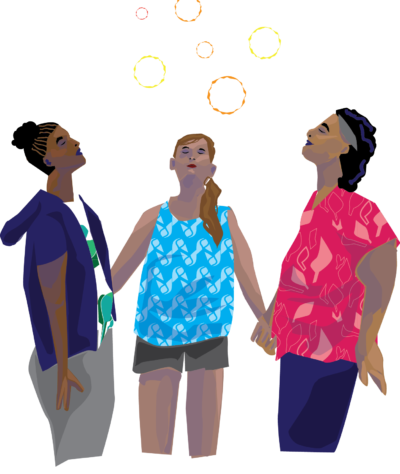Our Vision

Current State of Play
Some research has focused on intimate partner violence (IPV) as a risk factor for women in relation to HIV acquisition. This is important – studies show that over 60% of women living with HIV in the U.S. may have experienced intimate partner violence at some point in our lives. What’s less researched and less understood are the many ways that violence at all levels impacts the daily lives of women who are living with HIV.
Some studies show that living with HIV in itself may be a risk factor for violence and emotional abuse in relationships. Partners and even family members may use HIV status, the threat of public disclosure or the threat of prosecution under HIV criminalization laws as tools for coercion, abuse and control. Research has shown that exposure to violence can affect the immune system both before and after HIV diagnosis and that emotional abuse can increase the rate of CD4 decline. For WLHIV who are immigrants, reporting domestic violence to authorities may place them at risk of losing their immigration status, being detained, or even being deported, while also threatening the immigration status of their partners.
In addition to interpersonal violence, WLHIV in the U.S. are disproportionately affected by community-level violence and structural violence. Gun violence and violence against women of trans experience are forms of community violence that have personally impacted many of our members and their loved ones. Structural violence refers to the harm inflicted by social institutions and social structures, which prevents people from meeting their basic needs.
Forms of structural violence that directly harm the majority of women living with HIV in the U.S. include but are not limited to racism, HIV stigma, transphobia, the historical linking of access to health care to employment and a safety net system that requires people to be poor or sick in order to qualify for lifesaving medical care and other benefits. Because most WLHIV in the U.S. are Black and Latinx, racist policing practices and targeted attacks on immigrants, including those which threaten the ability of immigrants to access health care, are also forms of structural violence that harm U.S. WLHIV. Immigrants who try to report crimes to law enforcement may face threats to their immigration status or immigration status of their loved ones.
Thus, many health care, service delivery and law enforcement institutions allegedly in place to protect and serve have and continue to directly harm our communities, perpetrating further trauma.
Preventing or intervening in the epidemic of violence against WLHIV at the interpersonal, community and structural levels is critically important and our policy agenda reflects this priority. Equally, PWN’s policy priorities address the need to prevent further traumatization and to support WLHIV in healing from the trauma that results from these experiences of violence, which often span a lifetime and may be intergenerational. In particular, Black Americans and Indigenous people in this country are still suffering from massive community-level trauma resulting from our violent history of genocide, slavery, Jim Crow laws and mass incarceration of people of color.
At the federal level, we support:
At the federal level, we oppose:
At the state/local levels, we support:
Resources:
Trauma and HIV:
- Factsheet on Trauma and HIV by The Well Project
- Untangling the Intersection of HIV & Trauma: Why It Matters and What We Can Do GMHC Treatment Issues, Sept 2013. Naina Khanna and Suraj Madoori
- The Intersection of Women, Violence, Trauma and HIV by AIDS United
- Beyond “Getting Over It”: Why Trauma and Gender Violence Matter in HIV/AIDS Olivia Ford for TheBody.com
Interpersonal Violence and HIV:
- Factsheet on Violence against Women and HIV by The Well Project
- Intersection of Intimate Partner Violence and HIV in Women by the Centers for Disease Control and Prevention
- Explanation of the Violence Against Women Act (VAWA) by National Network to End Domestic Violence
Structural Violence and HIV:
- Structural Violence and Racial Disparity in HIV Transmission by Lane et al for the Journal of Health Care for the Poor and Underserved
- Intersectionality, HIV Justice and the Future of our Movement by Counter Narrative Project, HIV Prevention Justice Alliance, Positive Women’s Network-USA, Transgender Law Center, and Women With a Vision
Resources for Immigrants facing Interpersonal Violence:
- U Visa Process Info in English and Espanol by National Network to End Domestic Violence
Sanctuary Policies:
- Sanctuary Policies: An Overview
- Expanding Sanctuary: What Makes a City a Sanctuary? A Toolkit and Resources by Mijente
- Centering Black Women, Girls, Gender Nonconforming People and Fem(me)s in Campaigns for Expanded Sanctuary and Freedom Cities – policy brief by Andrea Ritchie and Monique Morris, National Black Women’s Justice Institute
Take Action!
- Contact your members of Congress to let them know you support federal Sanctuary legislation and VAWA reauthorization.
- Is your city a sanctuary city? Find out how you can support local sanctuary efforts. Contact a local immigration rights organization and contact your mayor’s office to find out if they have taken a position on protecting immigrants from ICE.


